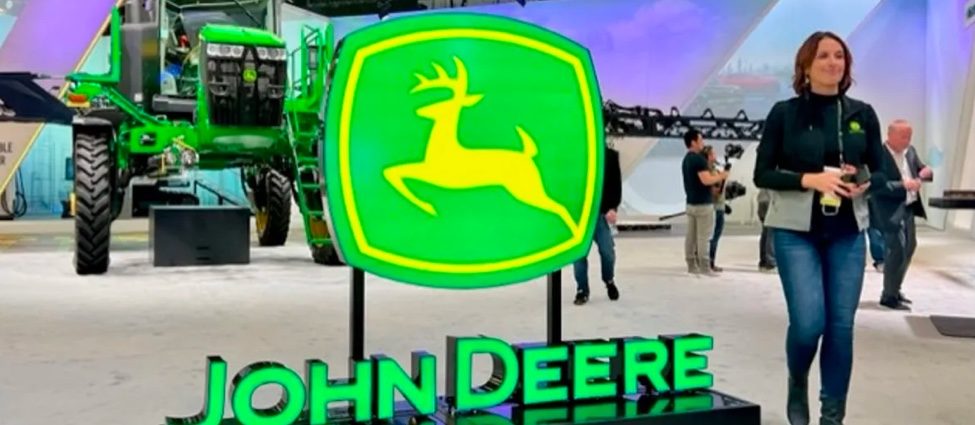Tech companies
Why tech companies can’t stop talking about sustainability
Sustainability was top of mind for the Travis Center long before it became a buzz word in the tech industry.
For the past 60 years, Senter’s family has grown corn, cotton, soybeans and rice on 20,000 acres in northeast Arkansas. Every year, he said, his family tries to do things a little better by downsizing. The focus is always on improving the land and ensuring that it can continue to produce for generations to come.
“Everyone talks about sustainability like it’s the new thing,” Senter said in an interview at CES. “We’ve been doing it forever. Farmers everywhere do what we do. If you don’t, you don’t survive.”
Sustainability was certainly a buzzword at CES this year, with everyone from the biggest tech giants to small startups touting the respective benefits of their products. The increased frequency of extreme weather events – from floods in Pakistan to wildfires in California – has changed awareness of the effects of the climate crisis. As a result, companies throughout the show embraced sustainability, whether by dropping a line in a keynote about using recycled plastics or showing off systems to make your home more efficient.
sustainability bandwagon
Companies were quick to point out their efforts. Samsung and Patagonia, which have previously partnered on environmental efforts, announced the creation of a washing machine that filters out microplastics from shampoos and other consumer products.
Meanwhile, Schneider Electric debuted its complete smart home energy ecosystem, receiving a CES 2023 Innovation Award for the app that brings it all together. The system is designed to save consumers money on energy and maximize the efficiency of their home.
This Jackery generator can be powered by the sun.
Bree Fowler / CNET
Lesser-known companies like portable-battery maker Jackery struggled to garner attention at CES’s evening press events. The company, which won four of the show’s innovation awards, showed off its solar and wind-powered generators.
The Department of Energy had a CES booth for the first time, and Secretary Jennifer Granholm talked about the Biden administration’s goals of achieving 100% clean electricity on the national grid by 2035 and a net-zero carbon economy by 2050.
Granholm told a packed room that targets are needed to combat climate change, responsible for the severe weather events that caused nearly a billion dollars in losses last year, as well as protecting America’s energy supply from “petro dictators” and To make it independent from others that would weaponize energy resources.
“It’s a matter of national security,” Granholm said. “Being a strong nation that is clean and energy independent is a matter of energy security.”
He also pointed to the billion-dollar economic opportunities related to clean energy that American companies can take advantage of, as well as the potential for new jobs that could help countless Americans.
Farm tech goes green
John Deere, one of the biggest names in farm machinery, had one of the biggest attendees at CES. Long associated with traditional farming equipment, the company has gone hi-tech in recent years with an eye towards improving efficiency for farmers.
Showcased at CES was a giant crop sprayer featuring the company’s See & Spray technology. The technology uses cameras and a system of image recognition designed to determine the difference between crops and weeds, so the machine can spray herbicide only on the plants it wants to get rid of, reducing chemical use Is.
The company also showed off its new Precise Shot Planting System, which it says can cut fertilizer use by up to 60%, saving farmers money and reducing the amount of additional chemicals going into the ground.
John May, president and CEO of John Deere, said in an interview with CNET that these improvements could have a huge impact on both the environment and the profitability of farmers.
“It’s really a winning value proposition for our customer and the environment,” said May, who also delivered one of the conference’s keynote talks.
While such high-tech machinery can be a sizeable investment, Sentor, who tested prelaunch equipment for John Deere and attended CES on the company’s behalf, said his industry has evolved to the point where Modern farmers would not be able to do this. What do they do without this and other types of technology.
This is especially true when it comes to sustainability, he added.
“We love what we do and we love our land,” Senter said of his family’s farming operation. “We love the ability to make things better.”
The Center said that from a practical point of view, farmers who do not make things better and do not improve, they are not going to make money.
“So,” he said, “you’ll be able to be sure that what you’re doing now will be sustainable in the future.”

